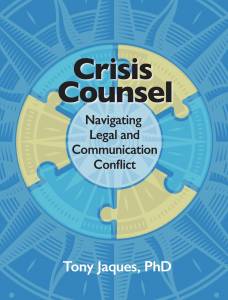Cartier Watches and Money Laundering: Lessons From Bungling the Basics
by Tony Jaques PhD, Director of Issue Outcomes Pty Ltd, for people who work in issue and crisis management, author of Crisis Counsel: Navigating Legal and Communication Conflict.
Two high-flying executives have found themselves in hot water after seeming to bungle some of the simplest basics of crisis management. The first executive brought to ground was Christine Holgate, CEO of Australia Post. Already under fire for allegedly extravagant expenses and an eye-watering salary, she told a parliamentary committee that four of her very well-paid top executives were given $3,000 Cartier watches as a reward for “an inordinate amount of work.”
In the face of predictable outrage the CEO’s “explanation” served only to intensify the scandal. “I have not used taxpayers’ money. We are a commercial organization.” However, while Australia Post is not government managed, it is government owned, so her defense was, at the very least, unwise. Unnamed government sources reportedly even called it “an eleven-word suicide note”. There is hardly any stakeholder more important than your owners and an angry Prime Minister – her ultimate owner – demanded the CEO step aside pending an investigation.
CRISIS LESSON: Know your stakeholders.
Describing the infamous Cartier watches, the CEO said they had cost $12,000 and were ordered in 2018 with the support of the then Chairman. “I didn’t actually purchase them. They were organized through my office on behalf of the chair and I.” She added: “It was a recommendation from our Chair that these people get rewarded.”
Unfortunately, the current Chairman promptly announced that a check of papers and minutes showed the then Board was not asked to approve or note the purchase of the Cartier watches. Moreover, he revealed the true cost was not $12,000 but just under $20,000.
CRISIS LESSON: Get your facts straight.
The second executive under fire was former Cabinet Minister Helen Coonan, Chair of Crown Resorts. The gambling giant was always going to face a reputational crisis after a Commission of Inquiry was set up in August 2019 to investigate TV and newspaper reports alleging the company engaged in money laundering; breached gambling laws; and partnered with junket operators linked to drug traffickers, money launderers, human traffickers, and organized crime groups.
But the appearance of Ms Coonan before the inquiry this month did little to ease the crisis. In fact, respected financial journalist Adele Ferguson characterized her performance as “butt covering, hubris and lack of remorse.”
The Chair admitted the company had “facilitated” money laundering, but blamed it on “shortcomings.” Her explanation? “It may have been ineptitude or lack of attention, but I don’t think it was deliberately turning a blind eye.” Adele Ferguson called it ”gobsmacking” that, so late in the inquiry, she would continue to adopt a legalistic approach to questions.
CRISIS LESSON: When you need to apologize and accept responsibility, just do it.
At the company’s AGM days later she apologized for their failures, and promised changes, including a new independent department to address money laundering. But this came well over a year since the original allegations. Commissioner Patricia Bergin herself had previously said she was “perplexed” why Crown had failed to launch it is own inquiry into what had gone wrong, how the failures occurred and how to stop a repeat.
CRISIS LESSON: Act promptly. Delay only makes it worse.
At the company’s fiery AGM Ms Coonan told an angry shareholder: “I don’t accept they’ve been shocking revelations… they’ve been historical shortcomings.” Hardly a phrase designed to acknowledge the company’s disastrous situation.
CRISIS LESSON: You don’t get to define when there is a crisis.
Crises are often complex, evolving events with many moving parts. But, as these two cases – and others – reveal, crises are too often amplified by failure to execute some of the basics.
A Parting Thought
“When in doubt, tell the truth.”
Mark Twain

